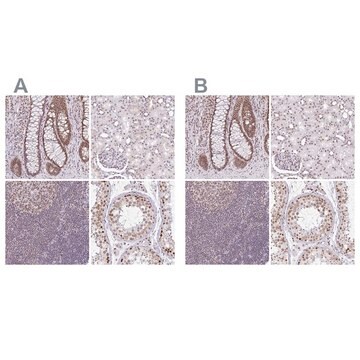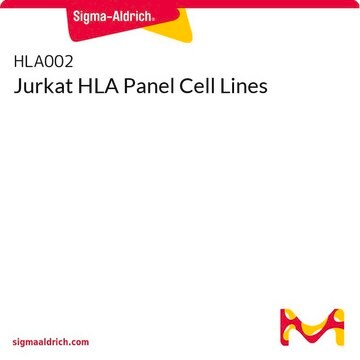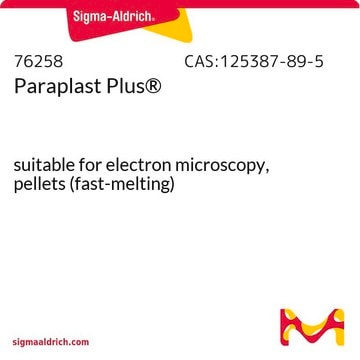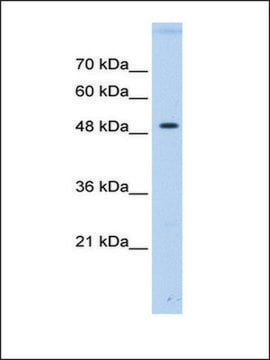推薦產品
生物源
rabbit
品質等級
共軛
unconjugated
抗體表格
affinity isolated antibody
抗體產品種類
primary antibodies
無性繁殖
polyclonal
形狀
buffered aqueous solution
分子量
antigen ~48 kDa
物種活性
mouse, rat, human
加強驗證
recombinant expression
Learn more about Antibody Enhanced Validation
濃度
~1.5 mg/mL
技術
western blot: 1.5-3.0 μg/mL using Jurkat cell extracts, rat kidney extracts (S1 fraction) or mouse kidney extracts (S1 fraction).
UniProt登錄號
運輸包裝
dry ice
儲存溫度
−20°C
目標翻譯後修改
unmodified
基因資訊
human ... PTPN2(5771)
一般說明
Protein tyrosine phosphatase non-receptor type 2 (PTPN2), also known as T cell protein tyrosine phosphatase (TCPTP), is an intracellular nonreceptor tyrosine-specific phosphatase that is expressed ubiquitously at various stages of mammalian development. PTPN2 exists as two alternatively spliced variants, PTPN2 isoform 1 (p48TC, 48 kDa) that is targeted to the endoplasmic reticulum by a hydrophobic C-terminal region and a shorter PTPN2 isoform 2 (p45TC, 45 kDa) that is targeted to the nucleus.
免疫原
synthetic peptide corresponding to a sequence located near the C-terminus of human PTPN2, conjugated to KLH. The corresponding sequence is identical in human PTPN2 isoform 2 and highly conserved (single amino acid substitution) in mouse PTPN2.
應用
Anti-PTPN2 antibody produced in rabbit has been used in:
- immunoblotting
- immunoprecipitation[1]
- immunostaining
生化/生理作用
PTPN2 acts on several cytoplasmic substrates including epidermal growth factor receptor (EGFR), insulin receptor (InsR), Shc, janus kinases (JAKs), and the nuclear substrate signal transducer and activator of transcription 1 (STAT1). PTPN2 has been associated with type 1 diabetes.
Protein tyrosine phosphatase non-receptor type 2 (PTPN2) is a tyrosine phosphatase that negatively regulates tyrosine kinase and JAK/STAT signaling pathways. PTPN2 inhibits oncogenic JAK1 and thereby functions as a tumor suppressor in T-cell malignancies. Genetic alterations in PTPN2 have been associated with the risk of Crohn′s disease and ulcerative colitis .
外觀
Solution in 0.01 M phosphate buffered saline, pH 7.4, containing 15 mM sodium azide.
免責聲明
Unless otherwise stated in our catalog or other company documentation accompanying the product(s), our products are intended for research use only and are not to be used for any other purpose, which includes but is not limited to, unauthorized commercial uses, in vitro diagnostic uses, ex vivo or in vivo therapeutic uses or any type of consumption or application to humans or animals.
未找到適合的產品?
試用我們的產品選擇工具.
儲存類別代碼
10 - Combustible liquids
閃點(°F)
Not applicable
閃點(°C)
Not applicable
TC-PTP directly interacts with connexin43 to regulate gap junction intercellular communication
Li H, et al.
Journal of Cell Science, 127(15), 3269-3279 (2014)
Maria Kleppe et al.
Haematologica, 96(11), 1723-1727 (2011-07-28)
We recently reported deletion of the protein tyrosine phosphatase gene PTPN2 in T-cell acute lymphoblastic leukemia. Functional analyses confirmed that PTPN2 acts as classical tumor suppressor repressing the proliferation of T cells, in part through inhibition of JAK/STAT signaling. We
Jürgen Glas et al.
PloS one, 7(3), e33682-e33682 (2012-03-30)
Genome-wide association studies identified PTPN2 (protein tyrosine phosphatase, non-receptor type 2) as susceptibility gene for inflammatory bowel diseases (IBD). However, the exact role of PTPN2 in Crohn's disease (CD) and ulcerative colitis (UC) and its phenotypic effect are unclear. We
Maria Kleppe et al.
Nature genetics, 42(6), 530-535 (2010-05-18)
PTPN2 (protein tyrosine phosphatase non-receptor type 2, also known as TC-PTP) is a cytosolic tyrosine phosphatase that functions as a negative regulator of a variety of tyrosine kinases and other signaling proteins. In agreement with its role in the regulation
T-cell protein tyrosine phosphatase (TCPTP) is irreversibly inhibited by etoposide-quinone, a reactive metabolite of the chemotherapy drug etoposide
Qing N, et al.
Molecular Pharmacology (2019)
Active Filters
我們的科學家團隊在所有研究領域都有豐富的經驗,包括生命科學、材料科學、化學合成、色譜、分析等.
聯絡技術服務









